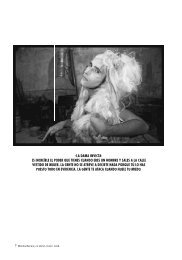MUSEUM, URBAN DETRITUS AND PORNOGRAPHY - Arteleku
MUSEUM, URBAN DETRITUS AND PORNOGRAPHY - Arteleku
MUSEUM, URBAN DETRITUS AND PORNOGRAPHY - Arteleku
Create successful ePaper yourself
Turn your PDF publications into a flip-book with our unique Google optimized e-Paper software.
an obstacle to masturbatory success. In<br />
any case, we are told, pornography does<br />
not merit hermeneutics. But perhaps the<br />
time has come for a general political ecology<br />
of culture concerned with re-assessing<br />
the production, defi nition and recycling of<br />
its cultural detritus, and in engaging in a<br />
possible revolution of sexual objects and<br />
imbecilic masturbators, who could become<br />
the subversive producers and critical users<br />
of pornography.<br />
During the 1980s and 1990s, the anti-pornography<br />
writings of Andrea Dworkin and<br />
Catherine Mackinnon 2 , which defi ned porn<br />
as sexist, patriarchal language that led to<br />
violence against the female body («porn is<br />
the theory, rape is the practice») eclipsed<br />
the arguments of so-called «sex- positive»<br />
or «pro-sex» feminism 3 which saw the dissident<br />
representation of sexuality as an opportunity<br />
for the empowerment of women<br />
and sexual minorities. While pro-sex feminism<br />
alerted us to the dangers of handing<br />
power for the representation of sexuality<br />
over to an equally patriarchal, sexist and<br />
homophobic state, anti-pornography feminism,<br />
backed as it was by conservative, religious<br />
and pro-life movements, advocated<br />
state censorship of porn as the only way of<br />
protecting women from pornographic violence.<br />
And so, pornographic language was<br />
once more banished to a cultural suburb,<br />
a ghetto that resisted criticism, standing<br />
outside the area of confl ict and confrontation<br />
so central to democracy.<br />
From the late 1980s on, however, in a partial<br />
escape from the dead-end of the feminist<br />
debate, a group of historians and theoreticians<br />
from the fi elds of literature and cinema<br />
—including William Kendrick, Richard<br />
Dyer 4 , Linda Williams 5 and Thomas Waugh<br />
began to extend their investigations to the<br />
relationship between body, gaze and pleasure<br />
to cover pornographic representation.<br />
Most of these analyses of pornography have<br />
been based on the constructivist hypothesis<br />
contained in Foucault's History of Sexuality<br />
Zehar]32]33<br />
which argues that modern sexuality and its<br />
pleasures are the result not of repression of<br />
an original desire so much as specifi c confi<br />
gurations of power-knowledge: modernity<br />
shifts the traditional ars erotica whereby<br />
pleasure arises from experience and selfinspection<br />
to a scientia sexualis, a set of<br />
scientifi c techniques (visual, legal, medical,<br />
etc.) destined to produce what Foucault<br />
calls «the truth of sex». This stresses the<br />
complicity between the pornographic techniques<br />
of representation and normalisation<br />
of the body and the medical and legal devices,<br />
the complexity and historical development<br />
of the pornographic narrative, and<br />
the political construction of looking and of<br />
pornographic pleasure and its relationship<br />
with the disciplines of management of the<br />
urban space. Here for the fi rst time, a critical<br />
context emerged, which at the beginning<br />
of the twenty-fi rst century was to lead to<br />
the emergence of «Porn Studies» 6 , allowing<br />
for a historical, cultural, cinematographic<br />
and political analysis of pornography.<br />
Positioning myself in this precarious critical<br />
space offered by porn studies, I will<br />
start with a genealogical exploration that<br />
will enable us to locate and understand the<br />
emergence of pornography in the West as<br />
part of the appearance of a wider (capitalist,<br />
global and mediatised) regime of production<br />
of subjectivity through technical<br />
management of the image 7 . The idea is to<br />
explore what we might term the bio-politics<br />
of pornographic representation. We shall<br />
ask: How does pornography emerge as a<br />
discourse and a knowledge of the body?<br />
What is the relationship between pornography<br />
and the production of subjectivity? Or<br />
in other words, how does pornography work<br />
within the political mechanisms of normalisation<br />
of the body and the gaze in the modern<br />
city? This investigation, addressed only<br />
tentatively and very briefl y here, will allow<br />
us to get some idea of the importance of the<br />
new post-pornographic micro-politics.



